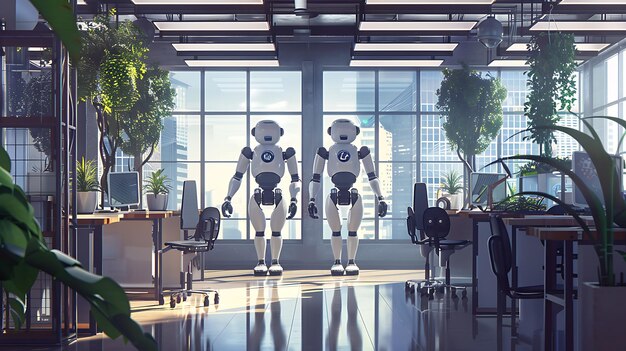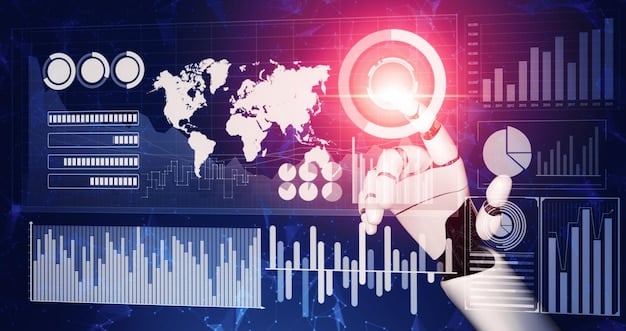Critical Analysis: AI’s Impact on US Job Market – Expert Forecasts

Critical Analysis: The Impact of Artificial Intelligence on the US Job Market – Expert Predictions reveals how AI is reshaping industries, creating new jobs while automating others, and requiring workers to adapt to remain competitive. Experts predict significant shifts, necessitating proactive strategies for workforce development and education.
The rise of artificial intelligence (AI) is rapidly transforming the landscape of the US job market. The conversation surrounding AI is no longer about distant possibilities; it’s about the present reality and the future that’s quickly unfolding. As AI technologies become more sophisticated and integrated into various industries, understanding its impact on employment becomes crucial.
In this Critical Analysis: The Impact of Artificial Intelligence on the US Job Market – Expert Predictions, we delve into the expert forecasts and analyses surrounding this transformative shift. Our goal is to provide a comprehensive overview of how AI is expected to reshape the workforce, exploring the potential challenges and opportunities that lie ahead for American workers.
Understanding the Current State of AI in the US Job Market
Artificial intelligence is no longer a concept confined to science fiction. It’s an increasingly pervasive technology that’s already impacting numerous sectors of the US economy. From automating routine tasks to augmenting human capabilities, AI is reshaping how work is done.
AI Adoption Across Industries
AI is being adopted at varying rates across different industries within the US. Industries such as technology, finance, healthcare, and manufacturing are at the forefront of AI adoption, leveraging its potential to improve efficiency, reduce costs, and drive innovation.
Examples of AI Implementation
Here are some examples of AI implementation in different industries:
- Healthcare: AI is being used for diagnostics, drug discovery, and personalized medicine.
- Finance: AI algorithms are employed for fraud detection, risk management, and algorithmic trading.
- Manufacturing: AI-powered robots and automation systems are enhancing productivity and optimizing supply chains.
- Retail: AI is enabling personalized shopping experiences, optimizing inventory management, and improving customer service through chatbots.

The current state of AI in the job market is one of rapid evolution and increasing integration. As AI technologies continue to advance, it’s essential to understand the implications for workers and the overall economy.
Expert Predictions on Job Creation and Displacement
One of the most pressing questions surrounding AI is its potential to create new jobs while displacing existing ones. Experts hold varying opinions on the net effect of AI on employment, but most agree that significant shifts are inevitable.
Positive Scenarios: New Job Categories
Some experts argue that AI will ultimately lead to net job creation by spawning new industries and job categories that don’t currently exist. These new jobs will require uniquely human skills, such as creativity, critical thinking, and emotional intelligence.
Areas of Potential Job Growth
Here are some potential areas of job growth related to AI:
- AI Development and Maintenance: The demand for AI specialists, data scientists, and machine learning engineers is expected to surge.
- AI Ethics and Governance: As AI becomes more prevalent, there will be a growing need for professionals who can ensure its ethical and responsible use.
- AI Training and Education: Training the workforce to adapt to AI-driven technologies will create opportunities for educators and trainers.
Concerns about Critical Analysis: The Impact of Artificial Intelligence on the US Job Market – Expert Predictions often focus on the displacement of workers in routine-based jobs.
Negative Scenarios: Automation and Job Losses
On the other hand, some experts are more concerned about the potential for widespread job losses due to automation. AI-powered robots and software can perform many routine tasks more efficiently and cost-effectively than humans, leading to displacement in sectors such as manufacturing, transportation, and customer service.

While AI undoubtedly presents opportunities for job growth, it’s crucial to address the potential negative impacts of automation and job displacement thoughtfully. Proactive strategies for workforce development and education are essential.
Skills in Demand: Adapting to the AI-Driven Economy
As AI technologies reshape the job market, workers must adapt their skills to remain competitive. Certain skills are becoming increasingly valuable in the AI-driven economy, while others are becoming obsolete.
The Rise of Soft Skills
Soft skills, such as critical thinking, creativity, communication, and collaboration, are becoming more important than ever. These skills are difficult for AI to replicate and are essential for problem-solving, innovation, and teamwork.
Importance of Continuous Learning
In the fast-paced world of AI, continuous learning is essential for workers to stay relevant and adapt to new technologies. Online courses, workshops, and professional development programs can help individuals acquire the skills they need to succeed.
In conclusion, adapting to the AI-driven economy requires a proactive approach to skills development and continuous learning. By investing in skills that complement AI technologies, workers can thrive in the changing job market.
The Role of Education and Training Programs
Education and training programs play a vital role in preparing the workforce for the challenges and opportunities of the AI-driven economy. Traditional educational institutions and vocational training programs must adapt their curricula to meet the evolving needs of employers.
Curriculum Adaptation in Educational Institutions
Educational institutions should incorporate AI-related topics into their curricula, teaching students about the fundamentals of AI, data science, and machine learning. This can equip students with the knowledge and skills they need to pursue careers in the AI field or apply AI technologies in other domains.
Industry-Academia Collaboration
Collaboration between industry and academia is essential to ensure that education and training programs align with the real-world needs of employers. Industry partners can provide valuable insights into the skills and knowledge that are most in demand, helping educational institutions tailor their programs accordingly.
Preparing the workforce for the AI-driven economy requires a collaborative effort between educational institutions, industry partners, and government agencies. By investing in education and training programs, we can ensure that workers have the skills they need to thrive in the changing job market.
Navigating the Ethical Considerations of AI in Employment
As AI becomes more prevalent in the workplace, it’s essential to address the ethical considerations surrounding its use. Algorithmic bias, data privacy, and workforce displacement are just some of the ethical challenges that must be addressed to ensure that AI is used responsibly and fairly.
Addressing Algorithmic Bias
Algorithmic bias occurs when AI systems perpetuate or amplify existing biases in the data they are trained on. This can lead to discriminatory outcomes in hiring, promotion, and other employment-related decisions. To mitigate algorithmic bias, organizations must carefully audit their AI systems and ensure that the data they are trained on is diverse and representative. The Critical Analysis: The Impact of Artificial Intelligence on the US Job Market – Expert Predictions necessitates addressing ethical issues.
Ensuring Data Privacy and Security
AI systems often rely on vast amounts of data, including sensitive personal information. Organizations must take steps to protect the privacy and security of this data, complying with relevant regulations and implementing robust security measures. Transparency and accountability are also essential in ensuring that data is used ethically and responsibly.
Navigating the ethical considerations of AI in employment requires a commitment to fairness, transparency, and accountability. By addressing these ethical challenges proactively, we can harness the power of AI while minimizing the risks to workers and society.
Strategies for Businesses to Embrace the AI Revolution
For businesses, embracing the AI revolution requires a comprehensive strategy that encompasses technology adoption, workforce development, and ethical considerations. By proactively planning for the changes that AI will bring, businesses can position themselves for success in the new economy.
Investing in AI Infrastructure
Businesses must invest in the necessary infrastructure to support AI adoption, including data storage, computing power, and software tools. This may involve upgrading existing systems or migrating to cloud-based platforms. Data quality and accessibility is also a key factor in successful AI implementation.
Promoting a Culture of Innovation
To fully leverage the potential of AI, businesses must foster a culture of innovation and experimentation. This involves encouraging employees to explore new AI technologies, conducting pilot projects, and sharing best practices across the organization.
The Critical Analysis: The Impact of Artificial Intelligence on the US Job Market – Expert Predictions requires a proactive stance from businesses.
Embracing the AI revolution requires a strategic approach that recognizes both the opportunities and challenges that AI presents. By investing in AI infrastructure, developing the workforce, and promoting a culture of innovation, businesses can thrive in the changing landscape.
| Key Point | Brief Description |
|---|---|
| 🚀 AI Adoption | Increasing across sectors like finance, healthcare, and manufacturing. |
| 🤖 Job Displacement | Automation may lead to job losses, especially in routine-based tasks. |
| 📚 Skill Adaptation | Workers need to develop soft skills and engage in continuous learning. |
| ⚖️ Ethical Concerns | Addressing algorithm bias and data privacy is crucial. |
Frequently Asked Questions
AI is used in various sectors, automating tasks, improving efficiency, and driving innovation in industries like healthcare, finance, and manufacturing.
Soft skills like critical thinking, creativity, communication, and continuous learning are essential as AI takes over routine tasks.
Some experts worry about widespread job losses due to automation, particularly in sectors like manufacturing, transportation, and customer service.
Businesses should invest in AI infrastructure, develop their workforce’s AI skills, and promote a culture of innovation to leverage AI effectively.
It is important to address issues such as algorithmic bias and data privacy to ensure AI is used responsibly and fairly, minimizing risks to workers.
Conclusion
In conclusion, Critical Analysis: The Impact of Artificial Intelligence on the US Job Market – Expert Predictions reveals a complex and rapidly evolving landscape. While AI presents both challenges and opportunities, proactive adaptation and ethical considerations are key to navigating this transformative shift.
By understanding the potential impacts of AI and investing in education, training, and ethical frameworks, we can strive to create a future where AI benefits both workers and businesses in the United States.





